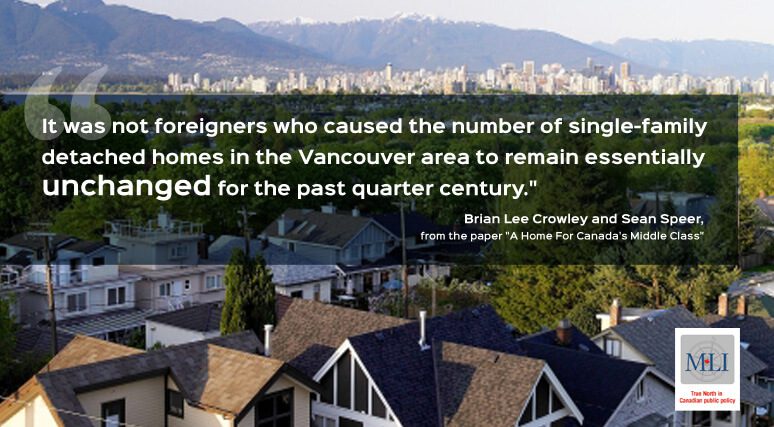Government regulations are choking off land supply, making housing an unaffordable dream for many Canadians
OTTAWA, Sept. 29, 2016 – Housing affordability has become one of the hottest media issues in Canada, as news reports pile up about rising prices in major markets such as Toronto and Vancouver. The trouble is, most of the debate has misidentified the key causes of rising prices, and ignored the fact that poor government policy is a major contributor to a housing affordability problem that is crushing middle class dreams, and constraining the success of those vital economic drivers: our big cities.
That’s the conclusion of a new Macdonald-Laurier Institute report by Sean Speer and Brian Lee Crowley.
To read the full paper, titled “A Home For Canada’s Middle Class: A plan for housing affordability and opportunity in Canada”, click here.
 The federal government is right to be concerned about housing affordability and focused on supporting affordable and responsible homeownership. Homeownership is positively associated with a raft of economic and social benefits that strengthen families, communities, and the country, write Speer and Crowley. And median households must now dedicate 71.7 percent and 119.7 percent of their incomes to own a single-family detached home in the Toronto and Vancouver areas respectively. But the cause has been misdiagnosed.
The federal government is right to be concerned about housing affordability and focused on supporting affordable and responsible homeownership. Homeownership is positively associated with a raft of economic and social benefits that strengthen families, communities, and the country, write Speer and Crowley. And median households must now dedicate 71.7 percent and 119.7 percent of their incomes to own a single-family detached home in the Toronto and Vancouver areas respectively. But the cause has been misdiagnosed.
 In the current politically-charged atmosphere caused by runaway prices in Toronto and Vancouver, politicians and others have clearly fastened on to marginal factors such as foreign investment or unoccupied houses as the primary problem despite limited evidence and little analytical reason to think that such factors explain the rapid price rises of recent years.
In the current politically-charged atmosphere caused by runaway prices in Toronto and Vancouver, politicians and others have clearly fastened on to marginal factors such as foreign investment or unoccupied houses as the primary problem despite limited evidence and little analytical reason to think that such factors explain the rapid price rises of recent years.
This is misdirection, according to Speer and Crowley. “It was not foreigners who caused the number of single-family detached homes in the Vancouver area to remain essentially unchanged for the past quarter century, or who limited detached home construction in the Toronto area in 2015 to its lowest level in 36 years,” they write.
Instead, a decades-long campaign of provincial and local restrictions on housing supply has contributed to this gulf between supply and demand, which in turn helped to create the housing affordability challenges gripping these regions.
Provincial and local governments influence the housing supply by designating where new homes can be built through land-use regulations, the cost of new homes through development fees and other levies, and the scope of renovations and additions to existing homes through building codes and city permits. These policy levers have been overlooked in much of the political and media attention about foreign investment but their importance in understanding the dynamics of the housing market cannot be overstated.
For instance, B.C.’s Agricultural Land Reserve encompasses 20 per cent of the land in the Lower Mainland and is roughly the size of full countries such as Slovenia, Israel and the Bahamas, and twice as large as the amalgamated city of Toronto. Yet B.C.’s land reserve is largely off-limits for home building. Ontario’s greenbelt around Toronto has a similar effect.
Crowley and Speer argue that Ottawa should make itself the spokesperson and agent for the middle class on the housing file and use its spending programmes to spur provinces and municipalities to stop obstructing housing supply, hampering the rise of the middle class and hobbling the cities that are such important generators of economic activity. They present a blueprint to restore homeownership as a key foundation for upward mobility, middle class opportunity, and economic growth:
- Ottawa’s new social housing and infrastructure funding to the provinces and cities should be conditional on reforms to restrictive zoning and housing regulations that support more housing supply. It is counterproductive to reward provinces and municipalities with affordable housing and infrastructure funding if these same governments are impairing housing affordability and in turn undermining the national economy and middle-class opportunity.
- Provinces and cities should revisit “urban containment” strategies with a clear eye to their impact on housing affordability. Policymakers must be more transparent about the trade-off between urban containment policies (such as anti-development greenspace and obstructive zoning and construction rules) and the real economic consequences that artificially constraining the housing supply imposes on low- and middle-income families and the broader economy.
- Future social housing spending should be reformed so that it supports responsible homeownership for low-income families rather than hastening further “class barriers” and a renter underclass. The emphasis should be on social housing which tenants can ultimately purchase on favourable terms. Partnership with Habitat for Humanity is one option to advance such reform.
***
Sean Speer is a Senior Fellow at the Macdonald-Laurier Institute. He previously served in different roles for the federal government including as senior economic adviser to the Prime Minister and director of policy to the Minister of Finance.
Brian Lee Crowley is the Managing Director of the Macdonald-Laurier Institute.
The Macdonald-Laurier Institute is the only non-partisan, independent national public policy think tank in Ottawa focusing on the full range of issues that fall under the jurisdiction of the federal government.
For more information, please contact Mark Brownlee, communications manager, at 613-482-8327 x105 or email at mark.brownlee@macdonaldlaurier.ca.





